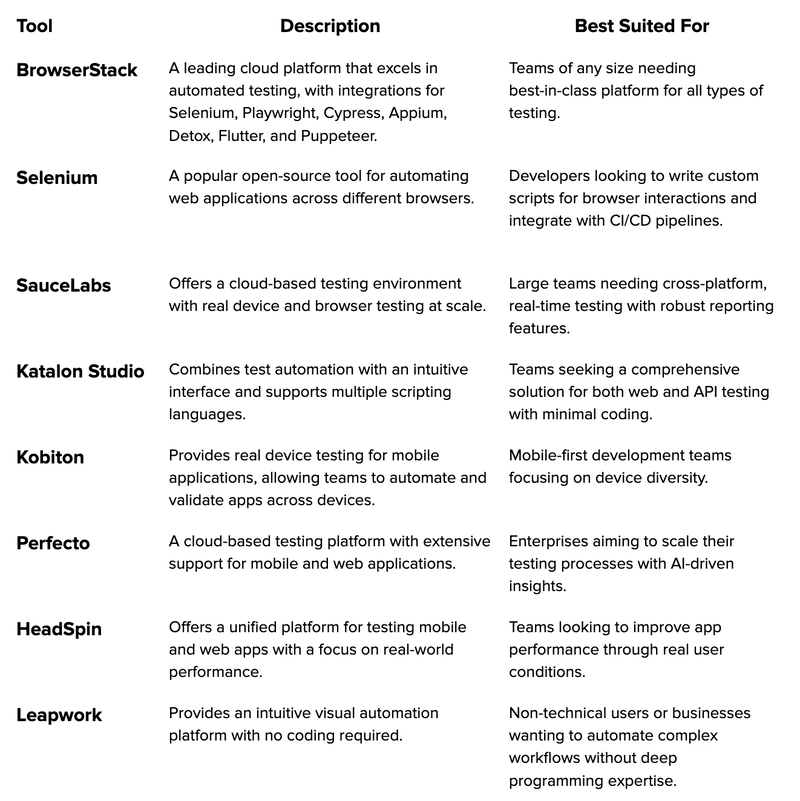In 2025, automation testing tools are more essential than ever, thanks to AI-driven capabilities that can learn and adapt to dynamic code changes. Even non-developers can create tests with low-code/no-code platforms, making automation accessible to a wider range of teams. These tools accelerate testing cycles and help ensure high-quality software while minimizing human error, giving businesses a competitive edge.
Top 15 Automated Testing Tools in 2025
1. BrowserStack
A leading cloud platform, BrowserStack excels in automated testing, with integrations available for Selenium, Playwright, Cypress, Appium, Detox, Flutter, and Puppeteer. It is best for teams of any size needing secure and reliable access to the latest or legacy device browser versions. Teams can use their automation grid to run hundreds of tests concurrently to scale faster.
2. Selenium
Selenium is a popular open-source tool for automating web applications across different browsers. Ideal for developers looking to write custom scripts for browser interactions and integrate with existing CI/CD pipelines.
3. Saucelabs
Known for its cloud-based testing environment, SauceLabs offers real device and browser testing at scale. Perfect for large teams needing cross-platform, real-time testing with robust reporting features.
Katalon Studio combines test automation with an intuitive interface and support for multiple scripting languages. Best for teams wanting a comprehensive solution for both web and API testing with minimal coding.
5. Kobiton
Kobiton delivers real device testing for mobile applications, allowing teams to automate and validate apps across devices. Great for mobile-first development teams focusing on device diversity.
6. Perfecto
Perfecto is a cloud-based testing platform with extensive support for mobile and web applications. It’s ideal for enterprises aiming to scale their testing processes with AI-driven insights.
7. Headspin
Headspin provides a unified platform for testing mobile and web apps with a focus on real-world performance. Best suited for teams looking to improve app performance through real user conditions.
8. Leapwork
Leapwork offers an intuitive visual automation platform with no coding required. Perfect for non-technical users or businesses wanting to automate complex workflows without deep programming expertise.
TestComplete is a comprehensive automated testing tool supporting desktop, web, and mobile applications. Ideal for teams needing robust, scriptless testing with integrated test management.
10. AccelQ
AccelQ is a low-code test automation platform that integrates with CI/CD pipelines. Best for Agile teams looking for a collaborative, flexible testing environment with minimal coding effort.
11. OpenText UFT
UFT (Unified Functional Testing) offers a rich, AI-powered automation solution for functional and regression testing. It’s best for large enterprises needing both stability and advanced automation capabilities.
12.LambdaTest
LambdaTest enables cross-browser testing with real-time execution on cloud browsers. Perfect for teams looking to validate their applications on multiple environments with ease.
13. Postman
Primarily known for API testing, Postman allows teams to automate complex API workflows and verify integration points. Great for backend testing and ensuring consistent API performance.
14. UIPath
UIPath focuses on robotic process automation (RPA) with powerful automation for both front-end and back-end testing. Ideal for businesses that want to automate repetitive tasks in their testing process.
15. Ranorex
Ranorex is a versatile tool for desktop, web, and mobile testing, supporting both scriptless and coded automation. Best for teams that want a comprehensive, user-friendly testing solution with flexible scripting options.



Top comments (0)